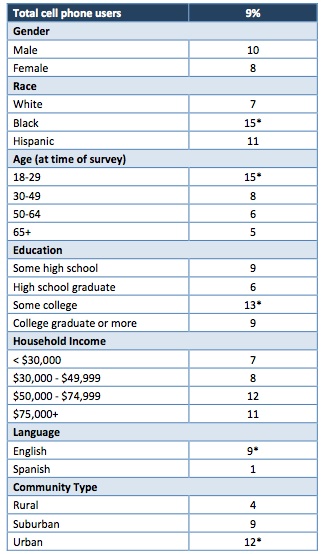 According to the latest survey conducted by the Pew Internet Project, of the 85 percent of American adults who use a mobile phone today 17 percent have used their phone to look up health or medical information. Perhaps not surprisingly, mobile phone users aged 18 to 29-years-old are much more likely to have searched for health information from their phones: 29 percent of this age group has conducted such a search.
According to the latest survey conducted by the Pew Internet Project, of the 85 percent of American adults who use a mobile phone today 17 percent have used their phone to look up health or medical information. Perhaps not surprisingly, mobile phone users aged 18 to 29-years-old are much more likely to have searched for health information from their phones: 29 percent of this age group has conducted such a search.
The survey shows that using a mobile browser to search for health or medical information is nearly twice as popular as having a health-related app: Only 9 percent of mobile phone users have a software app on their phone that helps them track or manage their health. The percentage goes up to 15 percent for mobile phone users aged 18 to 29-years-old. Only 8 percent of mobile phone users aged 30 to 49-years-old use health apps. African American mobile phone owners are more likely than other groups to use health apps: 15 percent do so compared to 7 percent of white and 11 percent of Latino mobile phone users, the survey found. Urban mobile phone users are more likely than those in suburban or rural areas to have a health app on their phones, but there is no significant differences between usage among men and women nor among income groups, the survey found.
"This means that health‐information searches and communications have joined the growing array of non‐voice data applications that are being bundled into cell phones," Pew's Susannah Fox writes in the report. "Fully 76 percent of cell phone owners (age 18+) use their phones to take pictures, for example, up from 66 percent in April 2009. Seven in ten cell phone owners send or receive text messages; four in ten access the internet on their phones. In addition, 35 percent of U.S. adults have software applications or “apps” on their phones (but only one in four adults actually use them)."
Of course, most Americans turn to health professionals, friends, or family when they have a health question. Pew notes that the Internet plays a "growing but still supplemental role" and mobile connectivity has not changed that.
Urban cell phone owners are more likely than those who live in suburban or rural areas to have a mobile health app on their phone. There are no significant differences between men and women, nor among income groups.
For the table at the right, the numbers represent the percentage of mobile phone users who have a health app on their phones -- the asterisks indicate a statistically significant difference.
For more on the Pew survey, head over to the health section of the organization's site for more data

















